33RD
ASSEMBLY DISTRICT
What’s the difference?
Three Republican candidates for the 33rd Assembly District try
to distinguish themselves
STORY BY MATT MCBRIDE
PHOTOS BY CHRISTOPHER GARDNER
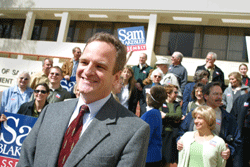 |
HOMEGROWN
|
Republicans love a good fight.
But you’d hardly know it by watching the three Republican candidates
vying for their party’s approval in the March 2 primary to be the
next 33rd District assemblyman.
The Republican candidates seeking a place on the Nov. 2 general election
ballot are certified financial planner and president of Blakeslee &
Blakeslee, Sam Blakeslee; attorney and rancher Michael Zimmerman; and
financial adviser and businessman Matt Kokkonen.
In other primary races, Democrat Stew Jenkins, an attorney; Green Party
member Tom Hutchings, a retired peace officer; and Libertarian Gary L.
Kirkland, a schoolteacher, all are running unopposed.
The district’s current Republican assemblyman, Abel Maldonado, is
seeking a seat in the state senate.
With so much agreement on key issues between the three Republicans, it’s
hard to distinguish one from the other. Instead, the race to be their
party’s nominee in the Nov. 2 general election has been built mostly
on differences in background.
Sam Blakeslee
Blakeslee is 48 years old. He attended elementary, junior high, and senior
high school in SLO. He did his undergraduate work at U.C. Berkeley and
has a master’s degree in geophysics from UCSB. After graduation
he took a job offer from Exxon Co. in Houston, Texas, where he moved into
management and became the company’s strategic planner.
Blakeslee said his job at Exxon taught him some valuable lessons that
he would bring to the Assembly.
He tended financial needs and projects for Exxon, and implemented plans
balancing what could and couldn’t be funded. He then managed the
plans, made sure people stayed on budget, and dismissed people who couldn’t
perform. He was in Texas seven years.
“The skills that I bring, and perhaps uniquely bring to [the assemblyman]
position, are the proven experience of dealing with large, complex budgets,”
Blakeslee said.
Blakeslee returned to the Central Coast in 1995 to help run the financial
planning firm Blakeslee & Blakeslee for his parents.
In 1998, he was elected to the Cuesta College Board of Trustees. In 2000
the board elected him president, and then reelected him in 2001. Blakeslee
said some of the decisions he faced as board president show his management
style.
“The toughest decisions at Cuesta were saying no to raises. I’ve
voted no on the last five raises in a row. My feeling then—as it
is now—is that we need to put every dollar possible into the classroom,
and where possible save jobs.
“In tough times, the last thing you do is increase salaries [if
it’s] going to affect the classroom or your skilled pool of employees.
Most of the employees have been there 10 to 15 years, they’ve got
great skill sets, and they understand the institution. If you give raises
and the price for that is you’ve got to fire some of your best people,
it’s a pretty bad tradeoff. When the money begins to flow once the
budget turns around, those people aren’t there anymore and you’ve
got to start from scratch.”
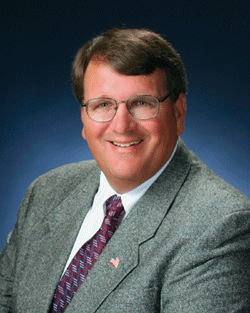 |
FARM BOY |
Mike Zimmerman
Zimmerman, 51, grew up in Modesto and was active in local 4-H clubs and
the Future Farmers of America. He attended Cal Poly as a farm management
major, graduating in 1973. He then attended law school at Western State
University. After graduation he moved to Arroyo Grande, opened up a law
office, and he’s “still sitting there now.”
Zimmerman believes he has the most going for him when it comes to the
job of assemblyman.
“I have the best background of all the candidates running in the
Republican primary. I sit down every day with clients that have problems.
We sit down and I apply the applicable law to come up with solutions.
Sometimes it requires negotiating with someone on the other side, and
that’s exactly what we do in the legislature. The legislature isn’t
just passing a budget.
“You don’t need a certified financial planner to know that
you can’t spend more than you bring in. My family budget works that
way. You’re adding a few more zeros, but it’s the same concept.”
He also thinks an attorney is best suited for the details involved in
the Assembly seat.
“There are hundreds of bills that come up every year. I understand
the law and have worked with it for years. [My opponents] are going to
have to rely on third parties telling them what the laws mean because
they don’t have training in that area. I may be able to spot problems
that the others may not be able to.”
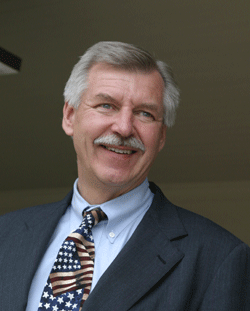 |
FINNISH FINISH Born in Finland, financial planner Matt Kokkonen says he’ll put his energy into resolving California’s budget woes. |
Matt Kokkonen
Kokkonen was born in Finland and immigrated to the United States on his
own at age 16. He graduated high school in New York and attended college
at Westmont in Santa Barbara, earning a degree in philosophy in 1967.
He also holds two master’s degrees, one in financial services and
one in management. He moved to San Luis Obispo in 1970 and has been a
financial planner ever since.
“I believe I am the best-suited candidate for the job because of
my background in finance. I understand budgeting, financial management,
and accounting. [In my 33 years of business] I have paid worker’s
compensation premiums, made payroll, and dealt with hundreds of business
clients with insurance and investment-related projects.
“I uniquely possess business knowledge, which I believe is sorely
needed in Sacramento.”
Kokkonen believes worker’s compensation is a state crisis that must
be solved immediately because California is suffering a hemorrhaging of
its finances.
“I have worked in that field for over 30 years; I understand worker’s
comp, medical insurance, and liability-insurance issues. Daily I get calls
from clients who are in anguish over increased premiums. Here, employers
have to decide between letting employees go or paying their insurance
premiums. It’s a tragedy, and it’s driving businesses out.”
Each of the three Republicans has similar stances on current issues.
On taxes: all three oppose Proposition 56. This measure reduces from two-thirds
to 55 percent the number of votes required to pass the budget and other
bills—including tax-increase measures—related to the budget.
Zimmerman expresses a familiar mantra.
“If [lawmakers] get to a crisis situation and [56] kicks in, they’re
going to be able to go ahead and pass tax increases and ignore the other
side. To me it’s just so obvious—I don’t know why anybody
would vote for it.”
Kokkonen agrees.
“That’s one of the most dangerous propositions we have faced
in a long time. I am absolutely opposed to Prop. 56 because the people
of California would have no protection against tax increases.”
On education: all three support allowing local school districts more authority
in deciding where to spend the money given to them by the state. Zimmerman
echoes his rivals on the subject.
“We need to be much more efficient in the way we spend money in
our schools. Get rid of the categorical funds where [officials] don’t
have any choice at the local level. We need to block-grant those funds
to the local school boards so they can decide where to spend it.”
And Blakeslee agrees.
“Grants need to be transformed into a more user-friendly, locally
controlled, block-grant formation.”
And on water rights: all three agree that it is an issue that must be
solved. Kokkonen sees the State Water Project as a step in the right direction.
“It would be unfortunate if some of the local entities did not sign
on to the state water project because it’s unavoidable that people
are going to keep coming here. We need to build the infrastructure and
services to provide for that.”
With their similar stances on the issues, all three hope their backgrounds
will set them apart and win votes for a seat on the Assembly.
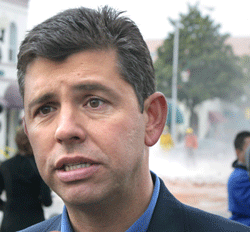 |
ASSEMBLYMAN |
Staff Writer Matt McBride can be reached through the managing editor at [email protected].
--------------------------------------------
County Supervisors
Housing, water, and health care
Third District winner will have their hands full tackling a variety
of local issues
STORY BY DANIEL BLACKBURN
PHOTOS BY CHRISTOPHER GARDNER
A retired police officer, a San Luis Coastal Unified School District Board
member, and a Pismo Beach City Council member; one of these three people
will be the next supervisor for SLO County’s 3rd District.
The winner will have to tackle issues such as how to deal with affordable
housing and growth, water rights, and an apparent move away from centralized
hospitals toward a growth in clinics.
They each have their own beliefs.
Patty Andreen
Patricia “Patty” Andreen grew up outside Philadelphia. She
attended college in Massachusetts, lived in the Midwest with her first
husband while attending medical school, then moved to Fresno. She made
her way to SLO 12 years ago.
In San Luis, she’s practiced law as co-council on nursing home safety
cases until she opened her own law office and dealt mostly with employment
law.
She was elected in 2000 to a position as a governing board member of San
Luis Coastal Unified school District. She said the main challenge of the
position was balancing the school budget.
“We were able to do it while giving our employees a raise and maintaining
really good programs,” she said. “It was a long process; l
learned a lot about building consensus, working with different groups,
and how to reconcile all those different interests and come up with a
plan for everybody.”
Andreen thinks most of the solutions in dealing with affordable housing
have already been identified.
She said one option she is in favor of is giving density bonuses to developers
to incite them into putting more units on a parcel of land.
She also favors inclusionary housing, where a developer is required to
include a certain percentage of moderate or low-income units when they
get approval for development.
She thinks there are solutions, but she said the problem is political,
as in “who has the will to put them into play?”
“When a politician is elected and looks to maintain popularity,
it becomes very difficult to require things to happen. Opposition comes
from the developers and it comes from the neighbors, and a lot of the
people who need affordable housing aren’t there to speak for themselves.
When you’re catering to those that already live here, and their
opposition, it forces the governing body to only listen to those that
are in the room.
“You have to listen to who’s not there sometimes.”
As far as growth is concerned, “I’ve been depicted as anti-growth,
which isn’t quite right. I believe in taking some additional population
here, because I think we have to—we have to build housing for the
workforce, but I would like to see our growth follow the principles of
smart growth because it’s important to maintain the community the
way it is.”
“I would like to see more retail development in downtown areas so
we can keep ourselves more like Santa Barbara and less like Santa Maria.
I’m in favor of more density and I’m in favor of trying to
keep the downtown a vital tourist, shopping, and eating area. I don’t
want to see everything leave downtown; that will hurt the vibrant core
of the city. [The downtown] is one of our biggest assets.”
In terms of the county’s hospital closings and apparent move toward
the use of clinics, she is a supporter.
“I supported the closing of General [Hospital]. I think the clinics
are going to be much more efficient, because they’re much closer
to where people live, and hopefully they will be more cost effective.
“It looks like we’re moving in a direction that’s going
to be able to deliver the most care for the money we have.”
Bill Rabenaldt
Bill Rabenaldt was born in Dover, N.H., and grew up in Argentia, Newfoundland,
until he was 18. He’s a U.S. Navy veteran and spent four years in
Vietnam. He’s a retired vocational training school principal who’s
worked in San Bernardino, Anaheim, Simi Valley, and Oxnard. He’s
been in SLO County since 1986. He’s served on the Pismo Beach City
Council for the last five years.
Rabenaldt believes the problem of affordable housing is “very solvable.”
But he said it’s just the tip of the iceberg.
“As you create more housing, you also create more traffic and water
issues, as well as sewer and environmental [problems].” He said
once the elected official understands those things, they can see what
needs to also be accomplished. He said it’s been done before all
over the country.
“San Luis Obispo does not need to reinvent the wheel,” he
said.
“I am in favor in densifying the city’s or the cultural locations,
if you will.”
He also said that building entire new communities appeals to him, too.
“There are models all over that are already successful. [They are]
good as long as you’re not looking at creating a bedroom community—you’ve
got to have industry and job creation within that community to sustain
itself.”
He said he believes the Nacimiento Pipeline is “probably necessary,”
but it’s a also a “fallacy.”
“If you go after every source of water there is and you use it up,
eventually you’re going to have no water,” he said.
Instead, he favors a forward-thinking concept that’s being used
in Europe.
He said some Europeans are building new homes with two exterior walls
with a cistern in the middle for collecting rainwater. This water is treated
through a membrane and is used for showers, cooking, and drinking.
Also, he said Englanders are installing mini-sewer plants in their homes.
The water used for showers, dishes, and toilets is treated and turned
from “black water” to “brown water,” which can
be used to flush the toilet or water your lawn.
He said an approach like this could save 40 percent of the water in the
county.
Jerry Lenthall
Jerry Lenthall is a retired police supervisor and sergeant for the San
Luis Obispo Police Department. He received his B.S. in Industrial Technology
from Cal Poly, and an M.B.A. from the University of Redlands. He is a
founding member and supervisor of the SLO County Bomb Task Force.
On the League of Women Voters Smart Voter web site, www.smartvoter.org,
Lenthall says he believes “the majority of future growth should
occur within the cities, and building in-fill projects is the most logical
solution. Urban sprawl is not a solution and causes more problems than
it solves.”
He also states that the county’s health care system continues to
evolve. His priority is that health care services must be delivered when
and where people need them.
“I think we can take a good lesson from what the private sector
has done. Satellite medical centers—whether it’s a MedStop,
a doc-in the-box, or a critical care center—allow our health care
to be more accessible, and hopefully a little more timely because not
everybody has the time to drive to General Hospital. They’re also
more effective in their delivery of health care services. The doctors
have found you don’t need a big overhead or a big office building.”
Lenthall thinks there are a lot of solutions for water-related issues
on the Central Coast, but he said the best he’s seen so far is the
Nacimiento pipeline.
“We’ve been studying [the issue] for over 30 years, and the
cost just keeps getting more and more expensive. The key is restoring
the trust and integrity of all the agencies involved [in the pipeline
project]. We want to get this thing built, and we want to get the water
delivered to the customer at the best value. The only way we’re
going to get that is by the commitment of as many agencies as possible—that’s
what’s going to make or break this thing.”
Lenthall’s beliefs about the pipeline project parallel his thoughts
about becoming supervisor.
“We’re trying to make the best decision that hopefully affects
the most people. It’s all about representing people.”
“What sets me apart is I don’t come from any specific, one-camp
background; my finances and my support have been extremely broad-based,
probably more broad-based than all the other candidates combined. That’s
the type of broad-based support that I think people want.
“I don’t even claim to be the smartest person that’s
running for office, because it’s not about smarts. It’s about
listening and problem-solving skills.”
--------------------------------------------
Ovitt faces stiff competition
First District must confront problems stemming from rapid growth
STORY BY DANIEL BLACKBURN
Veteran supervisor Harry Ovitt, currently chairman of the board and a
fixture on the county’s governing panel since 1989, is facing vigorous
challenges from Susan Harvey and Dan Del Campo for his First Supervisor
District seat.
District 1, which covers inland North County, is one of the region’s
prime agricultural areas and encompasses Lake Nacimiento.
Harry Ovitt
Incumbent Ovitt has been a county resident for 55 years, an Eagle Scout
who considers his accessibility to constituents to be a high priority.
Ovitt champions property rights for the individual, he said, and he wants
to continue what he describes as his ongoing effort to provide an increased
level of county services for North County residents “in line with
growth.”
Population growth is the “major issue” facing county residents,
Ovitt said, because such growth has a huge impact on planning, budget,
services, and resources.
Rural growth must be balanced with planning for urban services and facilities,
he added.
In a recent debate with other county supervisor candidates, Ovitt said
numerous options exist to help county planners encourage residential construction
that fits. The so-called county “housing element”—a
long-term planning document—was backed by Ovitt. It calls for more
master-planned communities and developments that combine homes with businesses.
Construction of condominiums and apartments also must be considered important,
Ovitt believes.
He said he is planning to “continue to protect all North County
resources, particularly Salinas water.”
Ovitt is an outspoken advocate of business and job creation through the
Economic Advisory Committee and Economic Vitality Corporation.
Ovitt’s endorsements include the county Cattlemen’s Association
and the Paso Robles Board of Realtors.
Susan Harvey
First-time supervisor candidate Susan A. Harvey is president of Paso Watch,
a citizen’s advocacy group that acts as watchdog to the North County’s
biggest city.
Harvey owns a high-tech international software firm for manufacturing
applications, Inifinite Functions.
She has resided in the district for 29 years and had operated a farm,
cattle ranch, and vineyard in San Luis Obispo County. Harvey earned a
bachelor’s degree in sociology from Regents College in New York.
Harvey thinks that quality of life in this county can be preserved with
a balance of growth and new infrastructure.
Harvey has a special interest in water resources, she has said during
the campaign.
She requested, in written comments on the Nacimiento Pipeline Project,
that “mandatory conservation programs be instituted by agencies
and cities wishing to participate in the pipeline project.”
Harvey said water conservation can be improved.
“We are all drawing on the same aquifer. Urban residents have the
safety net of municipal water projects to supply their water. The only
limiting factor to their water use is the cost. Currently the cost of
water bills seldom provides an incentive to conserve,” she said.
With a steadily shrinking 1.2 million county acres presently in agriculture
production, Harvey worries about the continuing health of the industry
in the face of encroaching development.
“We risk too much if we take a narrow, unbalanced approach that
favors any and all commercial, industrial, and residential development
on the premise that all growth is good regardless of where it occurs,”
said Harvey.
“What is happening on the borders of Paso Robles, San Luis Obispo,
Arroyo Grande, and the communities of Nipomo and Templeton illustrate
what I am talking about. The problem is not ‘no growth.’ The
problem is unlimited, uncontrolled, and unbalanced growth. Balance means
growth in the right places and at a pace where it does not overwhelm infrastructure,
revenue sources, water sources, air quality, traffic, and the quality
of life in this county. I will make this balance my priority.”
Harvey has endorsements from the Sierra Cub and the California Faculty
Association.
Daniel Del Campo
Dan Del Campo, former mayor of Thousand Oaks, said he plans to work for
“greater protection of agriculture and environmental resources.”
New to San Luis Obispo politics, Del Campo said he also sees health care
and affordable housing as major issues in this campaign.
He believes that one possible solution to the housing crisis is to implement
a program he said “has been used successfully elsewhere.”
This plan would require employers who hire large numbers of service workers
to pay a one-time tax to help finance workforce housing projects.
In a recent debate, Del Campo wondered if the Nacimiento Water Project
for North County users would be worth the money to water customers who
might face higher rates. He won’t condemn the plan, though.
“I’m not against it,” he told reporters. “I want
more answers.”
Del Campo, a marketing manager, is a director of the Nacimiento Regional
Water Management Advisory Committee and on the board of governors of the
Boys & Girls Club.
Del Campo has won the endorsement of the California Correctional Peace
Officers Association.
--------------------------------------------
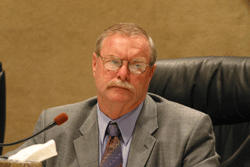 |
FIFTH DISTRICT INCUMBENT Supervisor Mike Ryan will face water conservationist Jim Patterson for the county’s 5th District seat. |
Ryan seeks third term
Fifth District incumbent is challenged by water conservation
manager
STORY BY DANIEL BLACKBURN
Mike Ryan, a rancher, real estate broker, and 5th District supervisor
incumbent, is seeking his third term on the board and faces a tough battle
from water conservation manager Jim Patterson.
The two-person campaign has been the fiercest political battle this year
in San Luis Obispo County, pitting pro-development Ryan against the environmental
expressions of Patterson.
Michael P. Ryan
Mike Ryan likes to claim that he has “helped keep county government
solvent” with a minimum of reductions to essential public services.
He said he “is determined that county residents receive what they
expect—good roads and bridges, well-maintained libraries and parks,
and strong public safety agencies.”
Ryan believes San Luis Obispo County has “avoided the hard times
that have affected neighboring counties,” and has one of the lowest
unemployment rates in the state.”
He said he has “devoted much time and effort to fostering a healthy
local economy in which small businesses can prosper and new jobs can be
created.”
This, he said, “means lessening the burden of taxes, fees, and regulations
and assuring that companies interested in locating to San Luis Obispo
have access to a well-trained work force, sound transportation systems,
affordable housing, and a plentiful water supply.”
The fundamental responsibility of government, according to the supervisor,
“is to provide essential services to the public: sheriff’s
deputies on the street; firefighters and paramedics at the ready; libraries
for learning; parks, zoos, and other recreational facilities for families;
and roads and bridges that are safe and secure for motorists.”
Ryan said he will “confront the new challenges of the coming years,”
which include affordable housing, improving the quality of health care,
and increasing water supplies.
Ryan has earned endorsements from County Assessor Tom Bordonaro and San
Luis Obispo Mayor Dave Romero.
Jim Patterson
Jim Patterson, who’s facing Ryan and making a contest of the 5th
District, is a water conservation manager and former owner of Bay Laurel
Nursery.
A 30-year county resident, Patterson is a native Californian and a Cal
Poly graduate.
Patterson said he believes the county is “in desperate need of an
updated master water plan that will analyze future needs.”
In the meantime, he said at a recent forum, “water conservation
and more efficient use of water are the surest sources of additional water.
These are immediate tools to stretch the water supply,” he added,
noting that this approach is “less expensive and more environmentally
appropriate.”
Patterson said the county’s plan for water development “has
been on the shelf for two years while certain parts of the county are
left not knowing what the water resource situation really is.”
Next, he said, the water plan must be made available to communities for
review “to fill in the gaps.”
His opponent has provided “many examples of circumventing the public
to avoid public input on important issues,” said Patterson, who
wants to “put the public back in the public participation process.”
A one-time ranch manager, Patterson said he places the declining affordability
of health care and the lack of workforce housing in priority positions
if he wins the seat.
“We are displacing the middle class in this county,” he said,
and county officials “haven’t done much to prevent it.”
Patterson is backed by the Atascadero District Teachers’ Association,
Atascadero Mayor George Luna, and councilmember Becky Pacas. ?
News Editor Daniel Blackburn can be reached at [email protected].
--------------------------------------------
Council districts, bonds, mayors on voters’ minds
Local voters will deal with a small slate of proposals this election day,
only one of which has sparked much community zeal.
Morro Bay residents will be asked to decide if separate city council districts
should be established to replace the current system of at-large election.
Additionally, the measure would change the post of mayor from an elected
office to a rotation among council members.
The debate has been fueled by the opposition to the proposal by a large
part of the city’s current leadership, including most of the present
city council and the Morro Bay Chamber of Commerce, funded largely by
city tax contributions.
Two bond issue efforts have been floated, one for $21.35 million for Lucia
Mar Unified School District, the other a $98 million try for Santa Maria
Joint Union High School District. Both will cover upgrading of current
facilities and construction of new classrooms.
In Pismo Beach, voters will decide if they want an elected mayor, and
if so, whether that politician would serve two- or four-year terms.
—Daniel Blackburn